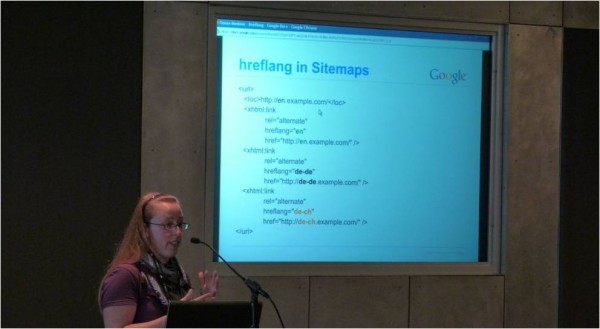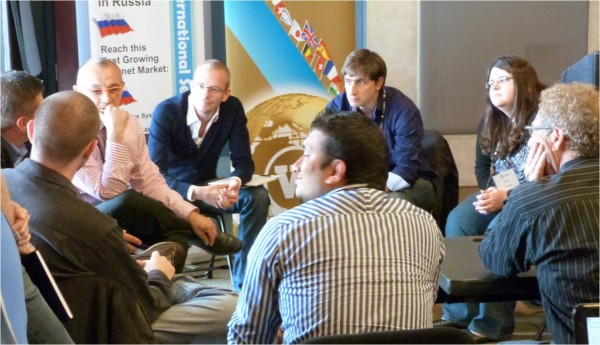The Latest On Google’s Hreflang Tag & Other Learnings From International Search Summit @SMX Advanced
Google has been moving lots of goal posts for us all recently and the “Hreflang” tag is a case in point. A succession of Google speakers has presented the latest “Hreflang” thinking at International Search Summits @SMX throughout 2012. On each occasion, the presentation and explanation was different from the one before. The bad news […]
Google has been moving lots of goal posts for us all recently and the “Hreflang” tag is a case in point. A succession of Google speakers has presented the latest “Hreflang” thinking at International Search Summits @SMX throughout 2012. On each occasion, the presentation and explanation was different from the one before.
The bad news is that keeping up with the changes has been tough, but the good news is that Google has actually been listening to the multinational market place for once!
But Don’t Canonicals & Hreflang Tags Belong Together?
Susan Moskwa presented first when Google was recommending the use of Hreflang tags and canonicals together. By the time the SMX in Munich came around, Johannes Müller from Google Zürich was explaining the Hreflang tag all on its lonesome — no mention of canonicals until the question was asked. Then the answer was, “We’ve seen that webmasters have difficulty in using canonicals and Hreflang tags together.” Very true.
At this point in the year, it was still confusing many people — though it’s worth pointing out that Canonicals and Hreflang tags do still work together and have a very useful function in certain specific cases mainly related to world languages only – such as English or Spanish.

Susan Moskwa Of Google At Seattle International Search Summit 2012 Source: WebCertain
By the time of SMX London and its International Search Summit, Pierre Far from Google was confirming that a new solution was in the pipeline, which Johannes in Munich had strongly hinted at — but it was not clear exactly how this would work.
Finally, last week in Seattle, Susan Mowska completed the circle with the announcement that Hreflang tags could now be incorporated into XML sitemaps. Phew. That was a relief for both webmasters and those of us that have been trying to explain this to users.
Is This A More Rounded & Thought-Out Proposition?
Susan must have been pretty relieved herself to be presenting a more rounded and thought-out proposition, since it was she who personally took the brunt of the kick back from delegates at the SMX’s International Search Summit in San Jose 2012.
Webmasters of large global websites have had three basic complaints about Hreflang tag:
- It’s Confusing
- It’s Too Expensive To Implement
- It Doesn’t Work
The confusion was partly to do with the connection with the Canonical tag but also the diffculties people had in terms of using this tag alongside local domains or Webmaster tools geo-targeting settings. Now this is clearer.
Use local domains if you can, use Webmaster Central if you’re stuck with generic domains and after those, Hreflang tag is the most important signal to give to Google to help users.
So Is The Hreflang Tag Fully Clear?
However complex it might be in presentation, the Hreflang tag basically means, “If by default, we at Google, would normally present one of your URLs from a different country to the user, if we know the local URL because it’s indicated by Hreflang tag, we’ll insert that instead.”
What remains unclear to webmasters is what happens to snippets and page titles in the results and the effect on rankings. Google’s guidance so far is to avoid having too specific content in page titles (eg currency values) but that rankings are not affected.
But the question which no one seems to be able to answer is: “if I rank at position 11 for my local page and first for my global page — what happens if my local page replaces my global page in first place? Does that mean I effectively lose my 11th place position — which might actually result in a net reduction of overall traffic?”
XML Sitemaps: The Low Cost Option
The cost of implementation has been much reduced by enabling the option to use XML sitemaps. The main issue for webmasters of global sites was that because you always have to add Hreflang tags in pairs (pointing to alternate content in a different language or region and back from it), you needed to add as many lines of code to each header as you had countries.
So a website with 100,000 pages and 200 countries….well, you can do the math. It was a lot of extra server load and production time. The XML sitemap approach significantly reduces the issue.
Does Hreflang Tag Actually Work?
Susan wasn’t able to give any guidance on the present uptake on Hreflang tags and the sitemaps option is also too new to have had any impact on the figures — so this will probably be the topic at the next International Search Summit.
However, delegates in the room had mixed reports with some using it and seeing no effect whatsoever and others believing it was effective.
More News From International Search Summit @ SMX

Preston Carey Of Yandex At Seattle International Search Summit 2012 Source: WebCertain
Preston Carey (above) presented the latest position for Yandex which is holding steady at a 60% search query share in Russia, though a much higher share of advertising revenues. Recently, he reported that Yandex revenues overtook television advertising in Russia, illustrating the continued growth of the Russian market.
We also learned that Yandex expects to open its doors for advertising in Turkey by the end of 2012, having continued to build up its audience there since its recent launch into the market.
At one point, Preston Carey and Susan Moskwa were debating the merits of a Yandex claim that Chrome in Russia doesn’t allow you to switch search engines away from the default Google. Susan was in contact with colleagues and disputed the claim. However, thankfully no blows were thrown!

Jeremiah Andrick Of Logitech At Seattle International Search Summit 2012 Source: WebCertain
Jeremiah Andrick (above) of Logitech was keen to highlight the importance of forging your own path into international markets rather than copying everyone else. “Don’t try and follow the Apple example,” he said, “Because you’re not Apple and you face your own specific issues.”
He described the steps Logitech took to combat a dramatic rise from one major competitor in China which was dramatically slicing into their market share. The solution? In this case, this involved adapting the product range by market and innovating for local needs rather than just relying on communication strategies.
Jeremiah’s excellent presentation was rewarded with the Medallion Award which is in the gift of delegates voting at the end of the day!

Vipin Singh Of Microsoft At Seattle International Search Summit 2012 Source: WebCertain
Vipin Singh of Microsoft.com is responsible for international SEO for Microsoft sites other than Bing and was a keen advocate of the Webmaster Central geo-targeting settings. He was keen to stress the importance of doing things right — including staying legal. The Microsoft team has quarterly legal training (gulp)!

Dimitriy Minenko At Seattle International Search Summit 2012 Source: WebCertain
Canadian-based Ukrainian international search specialist Dimitriy Minenko (above) talked about the need for detailed planning for international SEO and SEM campaigns and went through all the considerations to make.

Ani Lopez Of Cardinal Path At The Seattle International Search Summit 2012 Source: WebCertain
Ani Lopez of Cardinal Path provided some very interesting insights into how Google Analytics provides a very limited view of search engines, other than the very major ones.
By changing the page code, you can force GA to show more search engines, which crucially means you get to the see the keywords on those more local engines — a fact which is particularly key at a time when Google is not passing keywords in unsecured URLs!

Michael Bonfils of WebCertain At International Search Summit 2012 Source: WebCertain
No, “Your Majesty” – Michael Bonfils of WebCertain (above) was not rude about the British Monarchy — please don’t put him or me in the Tower!
In fact, Michael was talking about the dangers major brands face in social media for damage to their reputations by missing local cultural factors in their social media campaigns. The Queen example was related to Starbucks wishing Queenie a great jubilee from their non-British, .ie domain!

Delegates At Seattle's International Search Summit @ SMX Source: WebCertain
In the interactive sessions, delegates debated in groups everything from social media to geo-targeting and the new Hreflang tags. Have sympathy with the guy in orange glasses — that’s me trying to solve everyone’s problems in one day!
Opinions expressed in this article are those of the guest author and not necessarily Search Engine Land. Staff authors are listed here.
Related stories
New on Search Engine Land